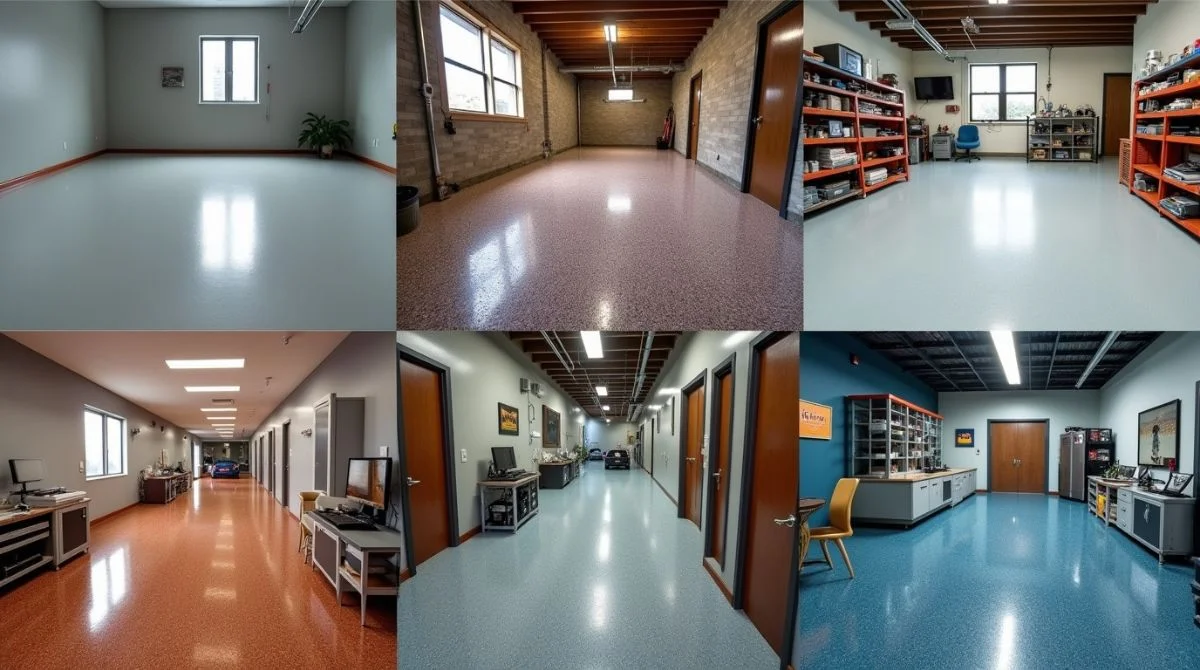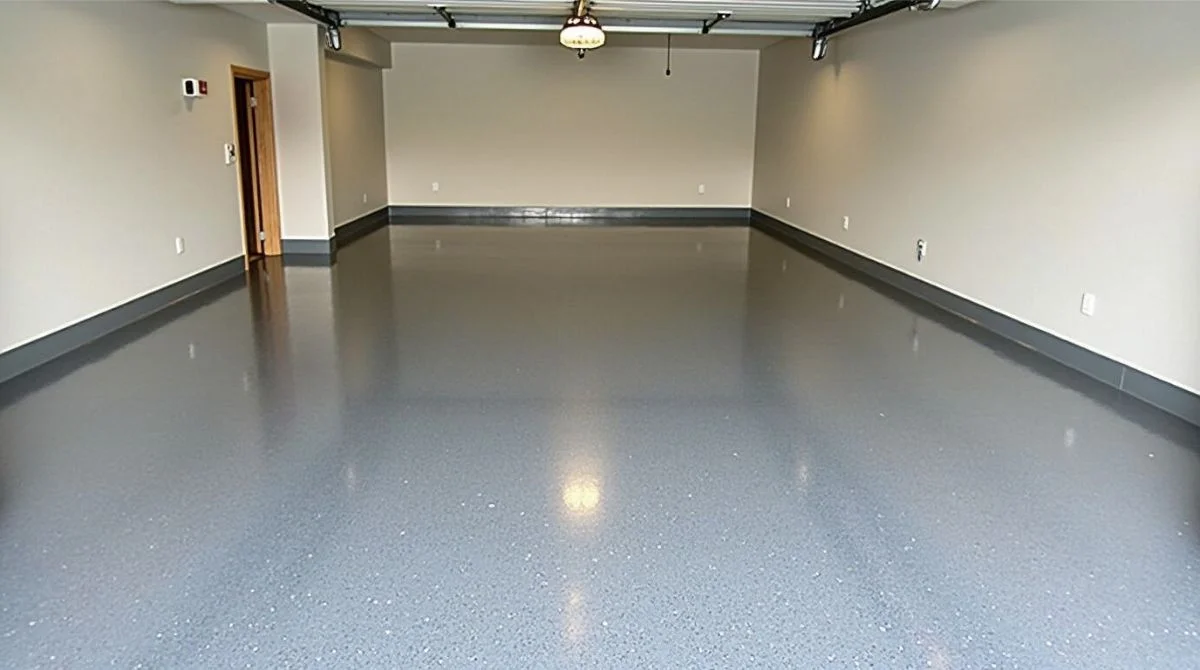When choosing epoxy flooring for a garage, basement, or industrial space, understanding the types available can help you pick the right fit. Let’s explore the main options and what sets each apart.
What is Epoxy Flooring?
Epoxy flooring is a type of surface coating made by mixing epoxy resin with a hardener. When combined, they form a strong, plastic-like material that bonds tightly to concrete floors. The result is a smooth, durable, and shiny surface that can resist stains, chemicals, moisture, and heavy traffic. It’s commonly used in garages, basements, warehouses, factories, and even commercial spaces because it’s easy to clean and lasts for years. Epoxy flooring also comes in different styles, solid colors, flake finishes, or metallic effects, so it can be both practical and decorative.
Types of Epoxy Flooring
1. Self-Leveling Epoxy
- What it is: A smooth, fluid epoxy that fills cracks and levels uneven surfaces.
- Best for: Garages and basements where a slick, easy-to-clean surface is desired.
- Pros: Creates a seamless, glossy look. Simple to maintain.
- Cons: Has minimal texture and may become slick when wet unless treated with additives.
Self-leveling epoxy is ideal when you want a clean, professional appearance. It bonds well to concrete and resists stains and chemicals.
2. Epoxy Mortar (High Build)
- What it is: A thick mixture of epoxy resin and sand or quartz aggregate.
- Best for: Heavy industrial zones, workshops, or areas with heavy machinery.
- Pros: Highly durable against impact, abrasions, and heavy loads.
- Cons: More expensive; may look rougher than smooth finishes.
Epoxy mortar provides superior durability and strength for zones with frequent forklift use or heavy machinery.
3. Epoxy Flake (Chip) Flooring
- What it is: Epoxy with decorative colored flakes broadcast into the coat.
- Best for: Garages, showrooms, or recreational basements.
- Pros: Hides imperfections, adds slip resistance, and offers customization.
- Cons: Leaves a textured surface that might trap dust, and edges can be uneven.
Flake floors are visually appealing and practical. They offer a speckled surface that camouflages dirt and surface flaws.
4. Epoxy Quartz Flooring
- What it is: Epoxy mixed with fine quartz granules.
- Best for: Healthcare, food processing, and restrooms where slip resistance and hygiene are critical.
- Pros: Durable, textured, chemical resistant, and easy to clean.
- Cons: Can appear a bit industrial; installation needs care for uniform distribution.
Quartz surfaces provide excellent grip and discourage germ growth in high-traffic or wet zones.
5. Anti-Static (ESD) Epoxy
- What it is: Epoxy is designed to prevent the buildup of static electricity.
- Best for: Electronics manufacturing, labs, or data centers.
- Pros: Protects sensitive equipment; meets industry regulations.
- Cons: Specialty use means higher cost, and professional installation is often needed.
Ideal for environments where static could damage electronics or ignite flammable materials.
6. Metallic Epoxy
- What it is: Epoxy mixed with metallic pigments for a 3D swirling decorative effect.
- Best for: High-end garages, basements, or showrooms.
- Pros: Unique aesthetics, customizable, glossy, high-end finish.
- Cons: Higher cost and installation skill required; not ideal for heavy wear zones.
Metallic epoxy adds visual appeal and luxury, but is best reserved for light traffic or decorative areas.

Comparing Epoxy to Polyaspartic or Polyurea
While epoxy is durable and cost-efficient, polyaspartic/polyurea coatings cure faster, resist UV yellowing, and offer high flexibility. These traits are appealing but often come with a significantly higher cost and require swift application.
Choosing the Right Epoxy?
Consider these key factors:
- Traffic type and weight: Use mortar in industrial settings; self-leveling or flake epoxy for garages.
- Slip resistance: Basements with moisture benefit from quartz or textured flake floors.
- Aesthetics: Metallic and flake epoxy offer design flair; plain epoxy is simple and clean.
- Chemical exposure: Industrial or garage settings exposed to solvents and oils do well with mortar or quartz blends.
- Budget: In Saudi Arabia, solid-color epoxy flooring typically costs between SAR 40 to 110 per square meter, depending on material quality and surface preparation.
- Installation skill: Some types require expert mixing and fast work; mortar and metallic epoxy may need professional installers.

Preparing the Surface
No matter the type, proper surface prep is critical:
- Clean thoroughly, remove oil, dust, and detritus.
- Repair cracks and holes.
- Profile or grind the concrete to help the epoxy bond.
- Test and manage moisture; use a moisture control system if the RH is high.
- Prime the floor before installing the selected epoxy system.
Inadequate surface preparation is the primary reason coatings fail or begin to peel.
Maintenance
Most epoxy floors are low maintenance. Sweep regularly, mop with pH-neutral cleaner, and deal with spills quickly. For high wear zones, a clear polyurethane topcoat can improve scratch resistance.
Final Recommendation – By Use Case
- Garage (car/street use): Flake epoxy with textured topcoat, good durability, and slip resistance.
- Basement (living or laundry): Self-leveling or quartz epoxy for ease of cleaning and moisture control.
- Industrial area (factory/shop): Epoxy mortar or quartz for extreme mechanical or chemical resistance.
- Decorative showroom or high-end garage: Metallic or flake epoxy for visual impact, balanced with function.
Need Professional Epoxy Flooring Services?
If you’re planning to install epoxy flooring in your garage, basement, or industrial space and want expert help, visit Floroz.com. Our team offers professional-grade materials, expert installation, and customized solutions to match your space and budget. Whether it’s a sleek garage floor or a heavy-duty industrial coating, we’re here to help. Contact us today to get started.


